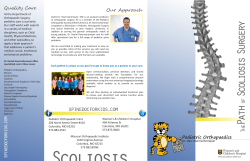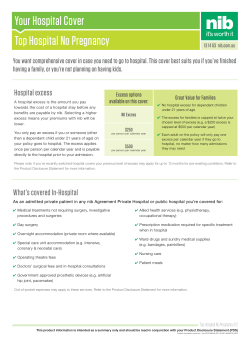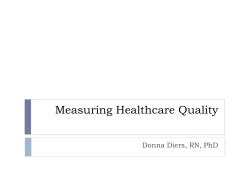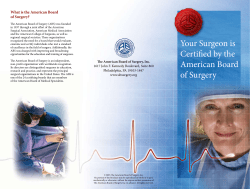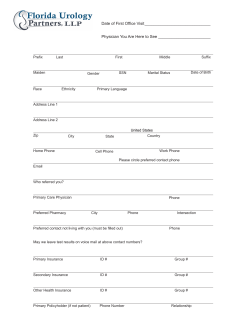
JAMES BUCHANAN BRADY UROLOGICAL INSTITUT E OVERVIEW
JAMES BUCHANAN BRADY UROLOGICAL INSTITUTE LAPAROSCOPIC LIVE DONOR NEPHRECTOMY OVERVIEW History of Laparoscopic Live Donor Nephrectomy Drs. Lloyd Ratner and Louis Kavoussi, were the first to perform laparoscopic live donor nephrectomy at Johns Hopkins in 1995. Over the last several years Johns Hopkins Hospital has developed one of the largest series of laparoscopic donor nephrectomy cases around the world. When compared to the conventional open donor surgical technique, laparoscopic donor nephrectomy has resulted in significantly less post operative pain, a shorter hospital stay, earlier return to work and daily activities, a more favorable cosmetic result, with recipient outcomes identical to the open procedure. General Information As a candidate for kidney donation, our foremost goal is to provide you, the donor, with the safest and most effective means of organ removal to ensure successful kidney transplantation to your friend or loved one. Laparoscopic donor nephrectomy is a minimally invasive technique of kidney donation, which provides the least amount of discomfort for the donor while maintaining the health and quality of the kidney for transplantation. OUR SURGEON Laparoscopic live donor nephrectomy is a surgical procedure that is performed by both urologist and transplant surgeons at Johns Hopkins. To learn about surgical procedures performed by the transplant center please follow this link http://www.hopkinsmedicine.org/transplant Mohamad E. Allaf, MD Office: 410-502-7710 Appointments: 410-955-6100 Fax: 410-502-7711 Email: mallaf@jhmi.edu APPOINTMENTS For appointments please call the number listed above. In the event of an emergency and you need to contact someone in the evening hours or on the weekend, please call the paging operator at 410-955-6070 and ask to speak to the urologist on call For appointments with the Transplant Surgeons call the Transplant Office at 410-955-5045 In the event of an emergency and you need to contact someone in the evening hours or on the weekend, please call the paging operator at 410-955-6070 and ask for the Transplant Coordinator on call. For directions to Johns Hopkins Hospital please use this link http://urology.jhu.edu/patients/ PRIOR TO THE SURGERY What to expect prior to the surgery All potential donors undergo extensive medical and psychological evaluation ensuring that the donor will maintain normal kidney function following surgical removal of the kidney intended for donation. The following tests are necessary prior to donating your kidney: Blood Work - There are several routine blood tests to assess your blood count, blood type, kidney function and general health. Tissue typing is also done through a blood test to assess the degree of genetic similarity between the donor and the recipient. Your blood will also be tested for many other diseases including Hepatitis and HIV. Other routine testing include: Electrocardiogram (EKG), chest X-ray, urinalysis, a stool test that can be done at home to check for blood in your stool, and a 24 hour urine collection. 3D CT Scan of the abdomen and pelvis - This is a sophisticated three- dimensional X-ray, which provides anatomical detail of the size, shape and blood vessels of the kidneys. All kidney donor candidates undergo a 3D CT to determine which kidney is the most suitable for donation. Female patients - will need a gynecological exam and a pregnancy test. A mammogram is necessary for women older than 39. Male patients - older than 39 will need to have a blood test called a PSA (prostate specific antigen) to assess for prostate problems including, prostatitis, prostate cancer and enlarged prostate. Psychological Evaluation - is done to ensure that the donor has a full understanding of his / her role in the transplant process. Final Cross Match - This is done through a blood test. You, along with the recipient, will have to have your blood tested within one week of the transplant to assure compatibility. If for any reason this test comes back positive, the surgery will have to be cancelled. There may be other options that the transplant team will discuss with you. Preparation for surgery Medications to Avoid Prior to Surgery Aspirin, Motrin, Ibuprofen, Advil, Alka Seltzer, Vitamin E, Ticlid, Coumadin, Lovenox, Celebrex, Voltaren, Vioxx, Plavix and some other arthritis medications can cause bleeding and should be avoided 1 week prior to the date of surgery (Please contact your surgeon’s office if you are unsure about which medications to stop prior to surgery. Do not stop any medication without contacting the prescribing doctor to get their approval). Bowel Preparation and Clear Liquid Diet Do not eat or drink anything after midnight the night before the surgery and drink one bottle of Magnesium Citrate (can be purchased at your local pharmacy) the evening before your surgery. Drink only clear fluids for a 24-hour period prior to the date of your surgery. Clear liquids are liquids that you are able to see through. Please follow the diet below. Clear Liquid Diet Remember not to eat or drink anything after midnight the evening before your surgery. Clear liquids are liquids that you are able to see through. Please follow the diet below. Water Clear Broths (no cream soups, meat, noodles etc.) Chicken broth Beef broth Juices (no orange juice or tomato juice) Apple juice or apple cider Grape juice Cranberry juice Tang Hawaiian punch Lemonade Kool Aid Gator Aid Tea (you may add sweetener, but no cream or milk) Coffee (you may add sweetener, but no cream or milk) Clear Jello (without fruit) Popsicles (without fruit or cream) Italian ices or snowball (no marshmallow) THE SURGERY The Operation Laparoscopic donor nephrectomy is performed under a general anesthetic. The typical length of the operation is 3-4 hours. The surgery is performed through 3 small (1cm) incisions made in the abdomen. A telescope and small instruments are inserted into the abdomen through these keyhole incisions, which allow the surgeon to completely free and dissect the kidney without having to place his hands into the abdomen.The kidney is then placed within a plastic sack and removed intact through either a horizontal or lower midline abdominal incision. Open Procedure Laparoscopic Procedure Potential Risks and Complications Although this procedure has proven to be very safe, as in any surgical procedure there are risks and potential complications. The safety and complication rates are similar compared to open surgery. Potential risks include: Bleeding: Blood loss during this procedure is typically minor (less than 100 cc) and a blood transfusion is needed in less than 5% of patients. If you are interested in autologous blood transfusion (donating your own blood) prior to your surgery, you must make your surgeon aware . Infection: All patients are treated with intravenous antibiotics, prior to starting surgery to decrease the chance of infection from occurring after surgery. If you develop any signs or symptoms of infection after the surgery (fever, drainage from your incisions, urinary frequency/discomfort, pain or anything that you may be concerned about) please contact us at once. Hernia: Hernias at incision sites rarely occur since all keyhole incisions are closed carefully at the completion of your surgery Tissue / Organ Injury: Although uncommon, possible injury to surrounding tissue and organs including bowel, vascular structures, spleen, liver, pancreas and gallbladder could require further surgery. Injury could occur to nerves or muscles related to patient positioning on the operating room table Conversion to Open Surgery: The surgical procedure may require conversion to the standard open operation if difficulty is encountered during the laparoscopic procedure. This could result in a larger standard open incision and possibly a longer recuperation period. Failure of Transplanted Kidney: A potential risk for the recipient is the possibility that the kidney may not function or will be slow to function. WHAT TO EXPECT AFTER SURGERY During your hospitalization Immediately after the surgery you will be taken to the recovery room and transferred to your hospital room once you are fully awake and your vital signs are stable. Postoperative Pain: Pain medication can be controlled and delivered by the patient via an epidural, or an intravenous catheter or by an injection (pain shot) administered by the nursing staff. Once on a regular diet, pain medications may be taken by mouth, instead of by IV or shots. You may experience some minor shoulder pain (1 -2 days) related to the gas used to inflate your belly during the laparoscopic surgery. Transient testicular pain can occur, but is uncommon. Nausea: You may experience some nausea related to the anesthesia. Medication is available to treat persistent nausea. Urinary Catheter: You can expect to have a urinary catheter draining your bladder (which is placed in the operating room with the patient asleep) for approximately one day after your surgery. It is not uncommon to have blood-tinged urine for a few days after your surgery. Intravenous Catheter: You can expect to have an intravenous catheter (IV) in for 1-2 days. (An IV is a small tube fed into your vein so that you can receive necessary fluids and stay well hydrated; in addition it provides a way to receive medications). Fatigue: Fatigue is common and should start to subside in a few weeks. Prevention of Blood Clots: You can expect to have SCD's (sequential compression devices) along with tight white stockings on your legs to prevent blood clots from forming in your legs. Incentive Spirometry: You will be expected to do some very simple breathing exercises to help prevent respiratory infections through using an incentive spirometry device (these exercises will be explained to you during your hospital stay). Coughing and deep breathing is an important part of your recuperation and helps to prevent pneumonia and other pulmonary complications. Walking: On the first day after surgery it is very important to get out of bed and begin walking with the supervision of your nurse or a family member to help prevent blood clots from forming in your legs. Diet: Most patients are able to tolerate ice chips and small sips of liquids the day of the surgery and regular food the next day. Length of Hospital Stay: The length of hospital stay for most patients is approximately 2 days. Constipation/Gas Cramps: You may experience sluggish bowels for several days following surgery as a result of the anesthesia. Suppositories and stool softeners are usually given to help with this problem. Taking a teaspoon of mineral oil daily at home will also help to prevent constipation. Narcotic pain medication can also cause constipation and therefore patients are encouraged to discontinue any narcotic pain medication as soon after surgery as tolerated. What to expect after discharge from the hospital Bathing: You may shower at home. You may shower after returning home from the hospital. Your wound sites can get wet, but must be padded dry immediately after showering. Tub baths are not recommended in the first 2 weeks after surgery as this will soak your incisions and increase the risk of infection. You will have adhesive strips across your incisions. They will fall off in approximately 5-7 days on their own. Sutures underneath the skin will dissolve in 4-6 weeks. Activity: Taking walks is advised. Prolonged sitting or lying in bed should be avoided. Climbing stairs is possible but should be taken slowly. Driving should be avoided for at least 1- 2 weeks after surgery. Absolutely no heavy lifting (greater than 20 pounds) or exercising (jogging, swimming, treadmill, biking) for six weeks or until instructed by your doctor. Most patients return to full activity at home on an average of 3 weeks after surgery. You can expect to return to work in approximately 4 weeks. Preventive Care: You should see your family doctor or primary care physician yearly for a routine check up and for blood tests to determine the function of your remaining kidney.You should take special care of your remaining kidney by avoiding any type of contact sport, which can cause damage to your remaining kidney. You should be on a no added salt diet and should always avoid high protein diets. Postoperative Visit: You will need to call the office of your surgeon soon after your discharge to schedule a follow up visit for 4 weeks after your surgery date. Related Links For additional information on Laparoscopic Donor Nephrectomy at Johns Hopkins Hospital please view the web site: www.hopkinsmedicine.org/transplant The National kidney foundation has a web site for living kidney donors: www.kidney.org The home page for living donors is: www.kidney.org/recips/livingdonors
© Copyright 2025

